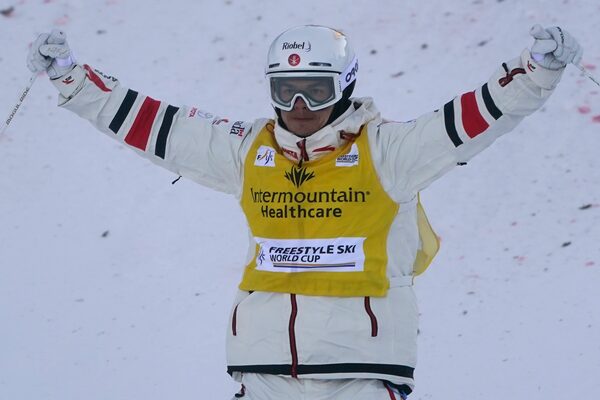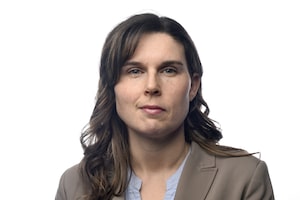
Canada's Mikael Kingsbury celebrates after a run in the finals of a World Cup freestyle moguls competition at Deer Valley Resort in Park City, Utah, on Jan. 14.Rick Bowmer/The Associated Press
Mikaël Kingsbury won a medal in the first few days at each of his two previous Winter Olympics, then stuck around to further soak in those Games.
The Canadian freestyle skier took silver at the 2014 Sochi Olympics, then gold in Pyeongchang in 2018. He enjoyed celebratory dinners with family and teammates at those Games and rooted for Canada’s other athletes. Kingsbury sat in the front row cheering wildly as the Canadian women’s hockey team beat the United States in the 2014 gold-medal final.
The 29-year-old from Deux-Montagnes, Que. is the most decorated moguls skier in history, and an overwhelming favourite to defend his gold medal on opening weekend of the Beijing Olympics. But the Canadian has prepared for a completely different Games experience this time.
There will be no foreign spectators roaring at the bottom of his run. Participants will be confined to a closed Olympic loop, sealed off from the Chinese public. Athletes will leave China right after competing, per strict COVID-19 protocols. Kingsbury’s Olympic trip will be much shorter than his previous Games, but that hasn’t zapped his motivation to deliver another gold medal.
“You compete and you go back home, and you do a lot of tests in between, so I’m used to that now,” says Kingsbury, who has lived that routine on the FIS World Cup circuit. “There’s more of a business side to it, but at the same time, I’m going to try to make it just as special as the others.”
After all, Kingsbury has bubbled himself away from family and friends for this, worked more diligently in the gym for this, even overcome an injury to two of his vertebrae for this. Plus, he now has an intriguing rival nipping at his heels.
The Canadian is commonly called the King of Moguls, because he has won everything possible in this mesmerizing event, which blends acrobatics with speed on skis. It features athletes thundering down a steep snow-covered course at breakneck speed, rhythmically carving around its bumpy moguls and executing two sets of high-flying aerial tricks before zipping across a finish line. Kingsbury has collected 11 world-championship medals – six of them gold. He’s a nine-time FIS freestyle World Cup titleholder for both moguls and overall freestyle, has a record 71 World Cup victories and 101 podium finishes.
He wears the same black T-shirt under his gear that he’s worn for every race since 2010. So well-washed now it’s nearly grey, the shirt reads, “It’s good to be the king.”
Kingsbury holds first place in the current FIS World Cup standing, with a slim lead over surging Japanese star Ikuma Horishima.
“Great guy, amazing skier, probably the best skier I’ve had to compete against in my whole career,” Kingsbury said by phone this week from a pre-Olympic training camp in Penticton, B.C.
Kingsbury and Horishima dominate the podiums, usually trading the top two spots. Kingsbury says he appreciates a great rivalry, and as an avid fan of Formula One racing, he points to the one between star race car drivers Lewis Hamilton and Max Verstappen.
His 24-year-old Japanese rival is having his best season. Horishima is skiing aggressively and mistake-free, making him a dangerous competitor at any event. Kingsbury has won six World Cup events and Horishima three. They are constantly on the podium together.
“This year, he understood something, and he’s just been super consistent, super clean and getting harder and harder to beat,” Kingsbury said. “And I like that, because he brings the best out of me, and I believe I do the same for him.”
Kingsbury says he hasn’t had a rival like this since his Canadian teammate and friend Alex Bilodeau, who edged him for gold at the 2014 Olympics.
He describes Horishima as a friend now, too. It’s a good bet they will be the last two competitors to go during the last final in Beijing. Kingsbury will be strategizing about what is best to beat Horishima on that day, paired with the conditions on the course. Kingsbury practises a run his coach calls hitting sixth gear. It carries more risk for mistakes because Kingsbury amps up the speed, so he’ll go to the sixth gear only if it’s necessary to win.
“We won’t know for sure until then if we’re going to need the bazooka,” said Kingsbury’s coach, Michel Hamelin.
The coach has known Kingsbury since he was a boy, and even then, he lit up for competition. Hamelin tells a story about nine-year-old Kingsbury at a camp, where Hamelin organized a fun contest to test the kids’ jumping abilities, without any tricks. The coach challenged the kids to jump as high as they could, and said he’d record their performances on video. Going head-to-head against others, and unfazed by the camera, Kingsbury grew quiet and focused.
“The kid became like a machine,” Hamelin recalls. “He did almost double the height of everyone else, and he used some tactic that I didn’t even show him how to do … that was clear to me that he was quite special, that he had something inside.”
Kingsbury is devoted to video study, says the coach, meticulous about detail. He’s studied every top moguls skier of the past 20 years. He recognizes exceptional specifics he could try in training – such as quiet arms or a great ski line – as he fine-tunes his technique.
Asked simply what makes Kingsbury so good, Hamelin mentions his hands, his eyes and the fact that he’s always having fun. Kingsbury has a remarkable memory, too. After he’s been training on a course, he can recall its specifics in detail. Kingsbury often closes his eyes and visualizes skiing the course, top to bottom, while the coach times him.
“I’ll say 3-2-1-Go, and he’s going to push in his head,” Hamelin said. “And he’s going to be quite close to the time that he last skied that course for real.”
This Olympic course has lots of unknowns, because no one has competed on it. The event will take place at Genting Snow Park, in the Zhangjiakou Zone, 180 kilometres northwest of Beijing. Kingsbury is ready for cold conditions, with artificial snow.
“I like that because I’m from Quebec and I ski often on snow like that, and I’ve been very good in China in the past. I enjoy that type of snow,” Kingsbury said. “I hope it’s cold there, I hope it’s difficult conditions because these are the conditions where I can shine a bit more.”
On Nov. 29, 2020, Kingsbury crashed hard on his back while landing a jump while training in Finland. He fractured two vertebrae in the middle of his spine but suffered no nerve damage. After missing three World Cups, he returned on Feb.4, 2021 and earned gold immediately at the tour stop in Deer Valley, Utah.
“It was just a little bump on the road,” he says of the injury.
Like many of Canada’s Olympic contenders, he has spent lots of time in the leadup to Beijing in a self-imposed bubble doing everything possible to steer clear of catching COVID. He avoided friends at Christmas back home, he last saw his family and girlfriend in person on New Year’s, even stayed apart from them during his World Cup stop at nearby Mt. Tremblant – an event with no fans. In B.C for his pre-Olympic training, he bubbled with just one teammate in a condo – remaining only there or at training.
“It’s only short term,” said the easygoing Kingsbury. “It’s just a little shot we have to take to reach our dreams and get the chance to compete.”
Our Olympic team will be writing a daily newsletter to land in your inbox every morning during the Games. Sign up today to join us in keeping up with medals, events and other news.
 Rachel Brady
Rachel Brady